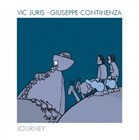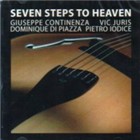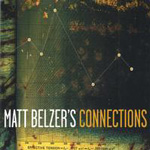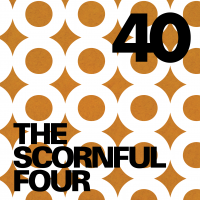Home » Jazz Articles » Interview » Giuseppe Continenza: Italian Bop Guitarist
Giuseppe Continenza: Italian Bop Guitarist
 I'm proud of my Italian-American heritage, but not because of bruschetta and olive oil. Some of the greatest bop guitarists ever are Italian-Americans: from Pat Martino to Joe Pass, Joe Diorio to Tommy Tedesco, or Jimmy Bruno to Gene Bertocini. So I decided to reach back to the mother land and track down a relatively new name on the scence, an archtop export who's actually from Italy, Pescara's Giuseppe Continenza.
I'm proud of my Italian-American heritage, but not because of bruschetta and olive oil. Some of the greatest bop guitarists ever are Italian-Americans: from Pat Martino to Joe Pass, Joe Diorio to Tommy Tedesco, or Jimmy Bruno to Gene Bertocini. So I decided to reach back to the mother land and track down a relatively new name on the scence, an archtop export who's actually from Italy, Pescara's Giuseppe Continenza. Continenza is a flamethrowing bopmeister who released Seven Steps to Heaven last year. This session basically consists of Continenza and fellow fretburner Vic Juris joining harmonic forces with the freakishly fluid bass guitarist Dominique DiPiazza to tear some familiar standards new f-holes. To those of you who think there are simply no new ways to arrange these tunes or navigate their changes, one listen to this refreshingly aggressive session will make you think again. Meanwhile, pour yourself a sambuca-laced espresso and hang with Giusseppe at our sidewalk cafe.
All About Jazz: How old are you and where you are from? Where's your home now?
Giuseppe Continenza: I'm 36 years old and I come from Torino, Italy but I live in Pescara.
AAJ: How did you first get into music?
GC: My father was a jazz guitarist and he had so many jazz albums around that I started listening to jazz music really young.
AAJ: Who were your first influences, as a musician, and more specifically, on guitar?
GC: I grew up listening to many jazz guitarists like Wes Montgomery, Kenny Burrell, Tal Farlow, George Benson, Django Reinhardt, and Pat Martino just to name a few. I'm still influenced by all different kinds of music. It's really a never-ending journey for me.
AAJ: Did you attend a music school? Who were your teachers and which had the greatest influence and why?
GC: Yes. I attended and graduated from G.I.T in Hollywood, California where I met and was influenced by great musicians like Joe Diorio, Don Mock, Ron Escheté, Gary Willis, Howard Roberts, Jeff Berlin, Scott Henderson and others that, during that time, taught there. The important part was really the playing with all these great musicians who continue to inspire my music and me. In 1990, I opened a jazz school in Pescara, Italy called European Musicians Institute where I've received many visits from guest musicians like Diorio, Henderson, Willis, Dave Friesen, Jack Wilkins, Bireli Lagrene, Jimmy Bruno and many others. Now, we have Dominique DiPiazza teaching at the school. We've got students from all over Europe and it's great to help musicians to become a jazz players and see them play and interact with all the great, famous musicians who visit the school.
AAJ: What are the most important concepts from the academic part of your experience?
GC: I think the organization of my studies and the study of composing and arranging. Also, I really loved to play with the big band we had at the school, and of course, the reading was really an important part of the curriculum.
AAJ: Because you are a teacher, you appear to be quite comfortable with the intricacies of music theory and its application to improvisation and composition. How much of that element do you bring into the compositional process? It probably varies based on the composition and the goals of the composition, right?
GC: Sure, its important to know all the rules for composing and arranging but it's very important to be creative and just be yourself when you compose as well as when you improvise. Often, when I'm improvising or composing I just use the music and my feelings, and all the knowledge or theory is used just to fix some ideas. I prefer to be spontaneous and not mechanical, that's for sure.
AAJ: What percentage of your time is spent on the teaching side versus the creative or performing musical side?
GC:I spend a lot of time teaching and actually I love to do it. For me it's a commitment—it's very important to help musicians to grow up and be professional. I really put a lot of energy into it and it's an important part of what I do. The creative part is also important, so usually I'll wake up really early in the morning and practice everything I know that will put me in a creative direction.
AAJ: Who are some of the great players you've met and gigged with in Italy?
GC: Actually there are so many and it was always different; I've played with Jimmy Bruno, Joe Diorio, Bireli Lagrene, Jack Wilkins, Dave Friesen, Gene Bertoncini, Paul Bollenback and many others.
AAJ: You have one of the world's greatest bassists, Dominique DiPiazza (who is also a fantastic guitarist), and one of our great guitarists, Vic Juris, on your CD. How did you find and then get these players to commit to the new project?
GC:I was touring with Bireli Lagrene and he had just recorded an album with Dominique DiPiazza and Dennis Chambers. So Bireli told me about Dominique and how good his playing is. I already knew him from his record with John McLaughlin and I really love his playing. He's just so natural and warm and as a person, and this really reflects in his music.
With Vic it was a bit different.I played a concert with Joe Diorio a few years ago and he told me about Vic. Basically, he said, "Giuseppe, you have to play with Vic. He is a great player and I'm sure something special will happen, something great between you two. So we got in touch after that.
AAJ: Can you explain some of the concept and focus behind the new cd?
GC: The focus was on playing good music and enjoying it! We chose some of our favorite standards and just made some arrangements of them. We played live in the studio. We wanted to play standards mixing up different kind of influences, giving our own interpretation to the tunes. As I said, I like to compose too and for sure, I'll release a recording featuring some of my compositions in the near future.
AAJ: Can you point us toward some of what you consider, the highlights of the disc?
GC: Check out our versions of "Stella by Starlight and "We Will Meet Again.
AAJ: Had you gigged with the unit on your new CD?
GC: The band never played before together. It was so great to play for the the first time together-it seemed as though we had been playing together for a long time. That's the magic of jazz music.
 AAJ: Please tell us about the previous duet record with Vic Juris. Did you do any performances off of that release?
AAJ: Please tell us about the previous duet record with Vic Juris. Did you do any performances off of that release?
GC: Journey was a duo jazz guitar records and it was really fun to do. We did a short Italian tour after the record came out.
AAJ: Please tell our readers the best way to purchase your recordings.
GC: The best and most economic way to purchase my records is to buy directly from the record companies. So, for Journey you can buy it at the Jardis Records website and for the CD Seven Steps To Heaven disc, you should go to Widesound.
AAJ: What axes do you focus on with your projects? Is it mostly archtop jazz guitar? I see in the photos you also play the Benedetto guitars.
GC: Yes I'm an endorser of Benedetto's Guitars. He actually made a custom model for me called the "Cremona Custom and it's just a wonderful instrument. I'm really in love with his sound—Bob Benedetto is just a great genius! I used the new guitar on the last record. You can play the Benedetto with just a microphone in front of it and it sounds wonderful, a great acoustic sound. There are many great combinations I like to use between the pickup and microphone. I'm also using a classical guitar built by the great Italian luthier Luciano Buscarini- another wonderful instrument. Occasionally, I use solid body guitars, like my Les Paul 25/50 with a Roland Guitar synth.
 AAJ: Guitarists today have so much sonic territory available to them. What factors go into any "self-editing," purely in terms of the sounds or patches you use, in terms of what sounds good and what sounds bad to your ears?
AAJ: Guitarists today have so much sonic territory available to them. What factors go into any "self-editing," purely in terms of the sounds or patches you use, in terms of what sounds good and what sounds bad to your ears?
GC:I think that a good sound has to be clean and definitive even if there is distortion. I love the acoustic sound especially. Although I occasionally use distortion or a synth, I prefer the clean fat sound of a good archtop or acoustic or classical guitar.
AAJ: In terms of harmonic territory, are there particular sources that you would point interested people towards? What books or recordings would you particularly advise students of harmony, improvisation and "time" concepts to seek out?
GC:I really liked the Dave Liebman book A Chromatic approach to Jazz Harmony.
Time, for me, is very important and I always stress that my students become good rhythm players, because it's the most natural way to get the perfect sense of time, so when you begin improvising, you'll have a strong foundation with the rhythm.
AAJ: Are there some elements of improvisation that are particularly fruitful for you, concepts that you keep revisiting and/or reinventing that keep your playing and your lines cutting edge and fresh?
GC:I'm really attracted to intervallic playing. It's a really interesting way to play and there are so many new things to discover. I've been really into it from a long time. It's always important, as well, to get new chords into my playing.
AAJ: Tell us the differences in the European market for your concerts and recordings versus the American market.
GC:I think that European market for live jazz music is much better than U.S. these days. There are many jazz festivals and clubs all over Europe, but in the US there's New York and then only a few others places, like San Francisco and L.A. They're great, but comparatively speaking, for the size of the countries, Europe is prolific. In Paris, London, and Stockholm and you can see so many live jazz concerts every day of the week.
AAJ: Are you planning to establish any kind of a presence in the US, or are you focusing on Europe for now?
GC: So far I'm focused on Europe but I'd love to come in US and do some playing live soon.
AAJ: How do you feel about the effects of the Internet on the music scene?
GC:In my opinion, the good thing about free music downloading is that many artists get a lot of exposure. On the other hand, the record companies won't be able to support the production of new records because of the decreasing sales. If the price of a CD can be kept from 10 to 12 dollars or euros, perhaps people would be more inclined to buy more download less for free.
 AAJ: Do you ever consider marketing recordings totally independently, via Internet?
AAJ: Do you ever consider marketing recordings totally independently, via Internet?
GC: It's much better to get a serious record company because they take care of the promoting of the records much better than the individual. It's very important that the owner of the record label is really involved in the project and really pushes the promotion side. On the other hand, I've had my own home page for many years. So many contacts have happened though that—it's really helpful for a professional musician.
AAJ: What are you listening to these days? Name five modern guitarists or other instrumentalists you love.
GC:I'm listening to Dave Liebman's The Unknown Jobim with Vic Juris on guitar, a great album with a lot of interplay.
My fave five guitarists are Joe Diorio, Vic Juris, Bireli Lagrene, Jack Wilkins & Jimmy Bruno.
AAJ: To wrap up, please tell us your musical plans, or projects in the pipeline, for 2005 and beyond.
GC:I'm going to be playing concerts in duo setting with many guitarists like Jimmy Bruno, Vic Juris, Jack Wilkins, and Howard Alden and do some touring with my jazz quartet with Dominique DiPiazza on bass. I'm also looking forward to recording a new album in the US with Jimmy Bruno and Vic Juris.
Visit Giuseppe Continenza on the web.
Tags
PREVIOUS / NEXT
Support All About Jazz
 All About Jazz has been a pillar of jazz since 1995, championing it as an art form and, more importantly, supporting the musicians who make it. Our enduring commitment has made "AAJ" one of the most culturally important websites of its kind, read by hundreds of thousands of fans, musicians and industry figures every month.
All About Jazz has been a pillar of jazz since 1995, championing it as an art form and, more importantly, supporting the musicians who make it. Our enduring commitment has made "AAJ" one of the most culturally important websites of its kind, read by hundreds of thousands of fans, musicians and industry figures every month.























